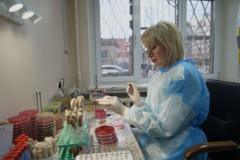As the war in Ukraine continues to take a toll on the nation, another devastating consequence is emerging: the alarming rise in drug-resistant bacteria. Pte Oleksander Bezverkhny's story epitomizes the grim reality facing many injured soldiers. After suffering severe injuries in combat, Bezverkhny underwent multiple amputations, only to find himself grappling with infections that resisted standard antibiotic treatments, leading to repeated cases of sepsis.
The phenomenon behind his struggle is known as antimicrobial resistance (AMR), where bacteria evolve to withstand antibiotics and other treatments. Data shows that the situation is not unique to Ukraine, as globally, about 1.4 million people died from AMR infections in 2021. In the UK alone, there were over 66,000 serious cases of antibiotic-resistant infections in 2023. However, the backdrop of war appears to have dramatically accelerated the proliferation of multi-resistant pathogens in Ukraine.
Dr. Andriy Strokan, deputy chief physician at Feofaniya Hospital in Kyiv, reports a staggering finding: more than 80% of patients admitted at his facility are suffering from infections caused by drug-resistant microbes. The war's chaotic medical environment complicates treatment efforts. As clinics treating war injuries become inundated with patients, infections often spread within medical facilities, despite health workers striving to maintain rigorous hygiene protocols.
The conflict has forced hospitals like Mechnikov in Dnipro to rapidly increase their bed capacity, with Dr. Volodymyr Dubyna noting that staffing shortages further hinder effective infection control. In surgical wards, one nurse may be tasked with caring for 15 to 20 patients, drastically limiting their ability to follow necessary cleanliness protocols. This overcrowding and lack of resources exacerbate the emergence and spread of AMR bacteria.
Moreover, the nature of the war means that patients often traverse multiple medical facilities during their evacuation, facilitating the transmission of various AMR strains. Unlike previous conflicts, where soldiers could be stabilized at a site and quickly airlifted to advanced medical care, Ukrainian patients frequently encounter several facilities, each harboring its pathogens.
The situation remains dire for hospitals, which struggle to isolate infected patients due to overwhelming numbers. Once infections occur, they're treated with "reserve" antibiotics — specialized, expensive medications that can lead to a faster development of resistance if over-prescribed.
Dr. Strokan emphasizes the difficult choices healthcare professionals face: "We must balance our scales. On the one hand, we must save a patient. On the other, we mustn't breed new microorganisms that will have antimicrobial resistance." Pte Bezverkhny, after enduring numerous surgeries and prolonged hospital stays, received life-saving medication sourced from volunteers. Although his life is no longer in immediate danger post-treatment, the continued evolution of resistant bacteria poses ongoing challenges for medical professionals navigating the growing crisis in Ukraine.
















